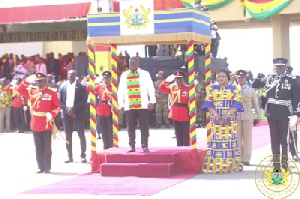In his 61st Independence Day address to the nation on Tuesday, March 6, 2018, President Nana Addo Dankwa Akufo-Addo shared his goal of Ghana beyond aid in more detail than ever before.
He insisted that, “Ghana beyond aid is meant to be more than a slogan. It is meant to propel us into the frame of mind that will quicken our pace of development. It is meant to change our mindset from one of dependency, to one of achieving our destiny.
It is meant to put us in charge of our own affairs and make us truly independent.
Above all, ‘Ghana beyond aid’ will give us the respect and dignity we deserve”.
Admitting that Ghana had underperformed in the area of economic development, the President recounted that “around the time of our independence, we had peers such as Malaysia, South Korea and Singapore.
Our per capita incomes were very similar at around $450 in 1960, and our economies were dependent on the production of primary commodities.
“Today, these countries, once our peers, have significantly transformed themselves into industrialised economies. Income per head in Singapore is now $51,431, South Korea at $29,115, and Malaysia at $9,623 compared to Ghana’s at $1,512”.
High-income Ghana at 100
Four years ago, the World Bank created per capita income categories of countries to facilitate its work. According to the 2014 matrix, a country needed to record a minimum per capita income of US$ 12, 736 to be considered a high-income country.
In that year, the bank pegged Ghana’s per capita income at USD$ 1,590 and called it middle income, but in the lower bracket. For me, that categorisation is not acceptable.
The middle of anything is half of that thing (50 per cent). According to me, 50 per cent of US$12, 736 is US$6,368. By that, our middle-income status is clearly in deficit of US$4,778. We need no argument on that.
What we need is an executable plan on how we can grow the economy to clear the deficit of US$4,778 to first, attain real middle-income status and move from there towards the high-income level of US$12,736.
Bearing in mind that the World Bank will periodically adjust to update the numbers to account for inflation, the per capita income is a moving target and will surely be much higher than the US$12,736 of 2014 to fit the high-income status in 2057, some 40 years from now when Ghana attains 100 years of independence.
This vision of a high-income country may seem impossible from where we stand today; a mere US$1,500.
But I am an incorrigible optimist. This is what we must argue for, fight for, “kill” for, and “die” for! Since 1992, the Ghanaian economy has stagnated at an average growth rate of five per cent. But we need to grow at a minimum of 10 per cent consistently for 10 years to transform our economy.
Ghana beyond aid
In my opinion, Ghana beyond aid is progressive, nationalistic, nice and even sexy.
But it is only one of the Big Hairy Audacious Goals (BHAG) in the vision of attaining a high income Ghana by 2057.
The President’s proposed “alternative financing model to leverage our bauxite reserves, in particular, to finance a major infrastructure programme across Ghana” is also a progressive strategy that must be encouraged and supported by all.
The move to reduce utility tariffs, particularly electricity from 10 to 30 per cent, is commendable and a good place to begin with the industrialisation efforts.
For any nation to industrialise, its utilities must be available in abundance and affordable as they contribute in a significant way to the cost of production and competitiveness of locally manufactured products compared to imported ones.
As we must necessarily industrialise to become a high-income country, which will automatically materialise the “Ghana beyond aid” slogan in the form of self-reliance and economic independence, I expect the government to do more to create the enabling environment for the manufacturing sector in particular to thrive.
The use of the state’s purchasing power to create a ready market for made- in-Ghana products is a game-changer.
For if there is no ready market for products from the flagship one-district, one-factory policy, our objective of adding value to raw materials cannot be attained.
Sense of urgency
I like the reported conversation between our first President, Dr Kwame Nkrumah, and his economic adviser on our economic development. That is the sense of urgency we must have, beginning with our leaders -
“Kwame Nkrumah: I want Ghana to industrialise in the shortest possible time.
Adviser Arthur Lewis: Mr President, it seems you want Ghana to walk before it learns to crawl.
Nkrumah: Who says we want to walk? We want to fly!”
I have studied the development trajectory of our peers at independence. They never put the “beyond aid” agenda on the front burner.
In fact, Lee Kwan Yew of Singapore was devastated when the British insisted on withdrawing their military base from the city state, then struggling to survive in the early years after independence. Apart from security, the British base contributed significantly to the national budget.
With an audacious vision like high income Ghana @ 100, which I will encourage us to adopt, I sincerely believe aid in strategic areas will be needed all the way.
From the experiences of South Korea, Singapore and others, it is only when we have attained high-income nation status that the need for aid will be no more.
Millions of dollars of aid money is returned to chest every year because we failed to account for previous releases.
So why are we in such a hurry to stop aid flow, when we can selectively make good use of it; and in fact, apply it judiciously and account for it to get more, to fast -track our vision of a high-income nation at 100?
Opinions of Wednesday, 14 March 2018
Columnist: William Dowokpor



















